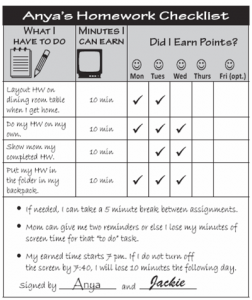Some kids are naturally easy-going, compliant, and adaptable. With very little input from you, they come home from school, sit right down, and do their homework. If they encounter a problem they can’t solve, or read a passage they don’t understand, they’re able to ask for help. Other kids are not as even-keeled. Their moods are quick to change, their tempers are volatile, and they are easily frustrated. They often complain that their homework is too hard or too boring. If they encounter difficulties before you have a chance to intervene, they have a meltdown. Their low frustration tolerance makes homework a battleground.
If you have an easily frustrated child living under your roof, here are a few simple measures you can try to break the cycle of negativity revolving around homework.
Tip #1 – Begin With An Easy Assignment - When your child is ready to begin homework, help her number the assignments in the order in which they’ll be completed. The first item on her to-do list should be the assignment perceived to be the easiest or the most enjoyable. For example, if your mathematically-inclined child comes home with spelling, math, and reading homework, tackle the math assignment first. This simple strategy puts kids in the right frame of mind from the start. They are less likely to procrastinate and are in a positive mindset when they approach harder assignments later on.
Tip #2 – Break It Down - Help your child break work down into manageable chunks.
Use Post-it arrow flags. Place one at the starting point and another part way through the assignment. Explain, “All you have to do is start here and end there. Come and show me your work when you’re done.” Visual learners especially like this approach.
Help your child to get started. Observe the completion of the first item so that you are sure it is done accurately. Then, set the timer for anywhere from six to sixteen minutes (it’s more interesting than five to fifteen). Encourage your child to work as hard as possible during this brief time to get over the hump.
Use color. Color code the symbols in math (red for addition, blue for subtraction, green for division, etc.). Start with the “green” problems or give a choice of order.
Cover the bottom portion of the worksheet or put an index card over the more difficult problems. Complete only the visible part first.
Tip #3 – Take A Break From Power Struggles - What should you do when you realize that a disagreement is becoming a power struggle? Extricate yourself ASAP by taking a quick break. Use these words:
“Let’s take a 30 minute break. I’ll be back at 2:34 pm.” Be specific about time.
“We’re both upset. Let’s grab a quick snack and then talk about a compromise.”
Tip #4 – Create a Checklist – Some children need and crave more structure than others. Parents of these youngsters often find that daily routines, rewards, and consequences are just the ticket to good behavior. In other words, your child should always know what to expect and should be clear about incentives and consequences even before she begins schoolwork. You can do this by creating a homework checklist.
First, think about what you want your child to do and narrow the list down to two to four homework-related tasks. Now, determine what it will take to motivate your child. For many kids, it’s “screen time” – the use of the computer, cell phone, and video games. If you are going to use screen time or another privilege as a reward, be sure it’s not available at any other time during the day. Finally, record any other rules below the checklist.
The following checklist belonged to a girl with whom I worked. She was a classic easily frustrated student and managed to engage her parents in daily verbal sparring matches over homework. Once we crafted a checklist and established a certain number of reminders she’d receive from her mother to get on track (she asked for two reminders), her behavior improved significantly.
You can come up with your own ideas, but remember, that once your child earns the reward, you cannot take it away. For example, if she earns 30 minutes of screen time, but then hits her sister, I don’t recommend taking the earned privilege away. Instead, consider an¬other consequence such as a time out. Children are more likely to follow through with incentive programs if they know their “winnings” won’t be withheld.
With just a few creative ideas and a whole lot of patience, you can put your easily frustrated child on the road to academic success.
Ann K. Dolin, M.Ed., is the founder and president of Educational Connections, Inc., a comprehensive provider of educational services in Fairfax, VA and Bethesda, MD. In her new book, Homework Made Simple: Tips, Tools and Solutions for Stress-Free Homework, Dolin offers proven solutions to help the six key types of students who struggle with homework. Numerous examples and easy-to-implement, fun tips will help make homework less of a chore for the whole family. Learn more at anndolin.com or ectutoring.com.




{ 1 comment… read it below or add one }
Hi! Need some help? Try to look at this site for more info. It help you to solve the problem of your children.
for further information clickhere!